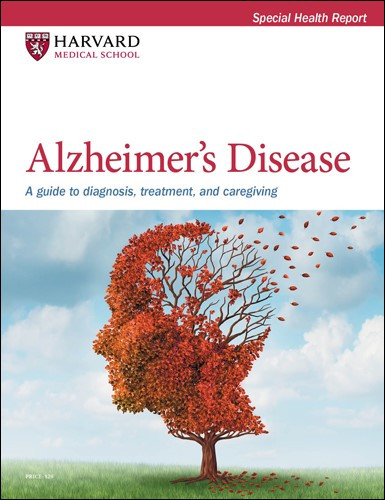Should you order your own Alzheimer's test?
You don't need your doctor's okay to get a new screening, but some experts say it's not ready for prime time.
- Reviewed by Anthony L. Komaroff, MD, Editor in Chief, Harvard Health Letter; Editorial Advisory Board Member, Harvard Health Publishing

The idea of getting Alzheimer's disease is troubling for anyone. And if you have a family history of the condition or if you've been experiencing persistent memory loss, you might wonder if it's time to seek testing. Traditionally, the process starts with a doctor visit and evaluation. However, you can now order an Alzheimer's blood screening on your own. The question is — should you?
Ordering without a doctor visit
The screening is called AD-Detect. It's available through Quest Diagnostics for $399, plus a $13 fee for physician services. Anyone 18 or older can go online and order AD-Direct, without a doctor visit, and a Quest-affiliated doctor will review the order to determine if it's medically necessary.
Eligibility is based on risk factors such as a family history of Alzheimer's, a decline in thinking skills (memory problems and getting lost, for example), previous head trauma or brain injuries, or excessive alcohol use.
If the test is prescribed, you go to the nearest Quest lab to have your blood drawn. Quest analyzes the sample, looking for two types of proteins: amyloid-beta 40, which is naturally present in the brain and considered normal; and amyloid-beta 42, which is involved in forming Alzheimer's brain plaques.
To see your results (a comparison of the protein levels), you log on at the Quest portal. You can also chat with a Quest-affiliated doctor about your results and next steps (it's covered in your fees).
Concerns to consider
Ordering the new Alzheimer's screening comes with risks.
It's not FDA-approved. The screening doesn't need the FDA's okay to be marketed to consumers.
It's only a screening tool. A positive result means that your risk of getting Alzheimer's is increased, but it does not mean that you definitely have Alzheimer's.
We don't know how accurate it is. Very little information about AD-Detect is available to the public. No peer-reviewed research on the screening has been published. So we don't know the risk of false results. A false negative result (one that says your risk is low or normal when, in fact, it's increased) might give you a false sense of security and cause you to delay pursuing diagnosis and treatment, even if you're having symptoms. A false positive result (one that says your risk is increased when, in fact, it's normal or low) might cause you undue stress and anxiety, plus time and expense in seeking further testing.
"There are few diagnoses I can think of that would be worse to hear. It might cause anxiety, depression, and even an alteration of life plans for the entire family," says Dr. Andrew Budson, a lecturer in neurology at Harvard Medical School and chief of Cognitive and Behavioral Neurology at the VA Boston Healthcare System.
There's a delay to speak with a doctor. It can take a few days to speak with a Quest-affiliated doctor about your results, which might be stressful.
You might need further testing. If the results suggest you need additional testing, you'll have to turn to a specialist. Would you have access to a neurologist who specializes in Alzheimer's care, and facilities offering tests you might need? Would it be hard to get an appointment to discuss your next steps? "The wait to see dementia specialists can be six months or longer," Dr. Budson says.
Getting a diagnosis
An Alzheimer's diagnosis requires much more than a blood screening. It involves a comprehensive evaluation of your current and past health problems, physical and neurological exams, family history, blood tests to rule out hidden conditions that might be causing memory problems (such as vitamin B12 deficiency), and imaging tests.
"I would start with a brain MRI or a CT scan to look for structural problems like strokes or brain tumors. If we've ruled out everything and I still suspect Alzheimer's disease, I might also order an amyloid PET scan or a test of spinal fluid that could contain Alzheimer's markers," Dr. Budson says.
Doctors can also order blood tests designed to help diagnose Alzheimer's. Like the AD-Detect screening, these tests look for amyloid proteins, but they go further by looking for other markers of Alzheimer's. "But these tests aren't yet as accurate as a spinal fluid test or a PET scan," Dr. Budson says.
What you should do
Self-ordered screening blood tests may someday have a role in investigating a possible Alzheimer's diagnosis, but Dr. Budson thinks they're not a good idea today. "If you have concerns about Alzheimer's disease, talk to your primary care doctor. Investigate your risks together. If necessary, get recommendations for an Alzheimer's specialist," he says. "This could be one of the most important decisions of your life. Approach it as carefully as possible."
Image: © Miljan Živkovic/Getty Images
About the Author

Heidi Godman, Executive Editor, Harvard Health Letter
About the Reviewer

Anthony L. Komaroff, MD, Editor in Chief, Harvard Health Letter; Editorial Advisory Board Member, Harvard Health Publishing
Disclaimer:
As a service to our readers, Harvard Health Publishing provides access to our library of archived content. Please note the date of last review or update on all articles.
No content on this site, regardless of date, should ever be used as a substitute for direct medical advice from your doctor or other qualified clinician.
















